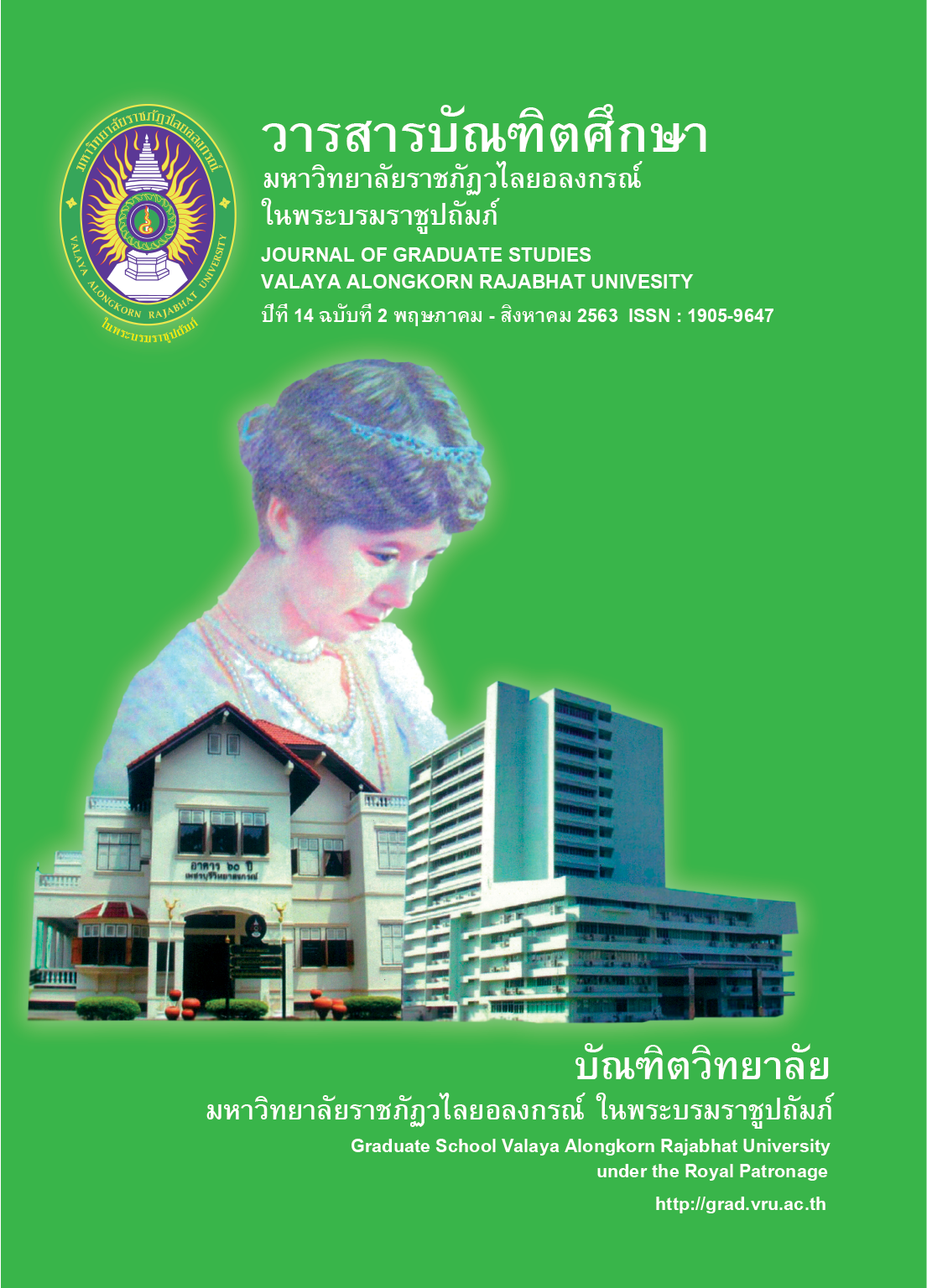THE DEVELOPMENTOF WATER QUALITYMANAGEMENT TO THE SELF-RELIANCE OF KOKSABANG COMMUNITY, THAKARM, ARANYAPRATATH, SRAKEAW
Main Article Content
Abstract
Expansion and development of community are causes of environment problems, especially not sufficient and poor quality of water for consumption. The community have to enhance capacity and water quality management by themselves. Therefore, this research aims at studying status of water utilization and water quality for consumption. The target of this study is to develop capacity of people in the community to manage water quality for relying on themselves and to find out policy method for sustainable water management. The studied area is located at Koksabang Community, Thakam District, Amphoe Aranyaprathet, Srakaew Province. The research was conducted by cooperation workshop between researchers and local people. The participants were 150 people, consisting of household representatives, community leaders, local administrators, and concerned network partners. Methodology of the research consisted of questionnaire, questions, SWOT analysis, evaluation form, MU Test Kid for water quality analysis, and recorded forms. The analysis was conducted by percent, average, standard deviation, content evaluation, and water quality analysis compare with the water standard.
The research found 119 households of Koksabang community relied on water supply of the community. The water supply was originated from water storage size 8 Rai with 6 meters depth. The water supply was distributed to household by electrical pump. The water supply price was 5 baht per unit. Each household paid 50-400 baht per month. Most drinking water was rain water kept in a big jar or bottle water. Acid rain was a problem in this area by the rain water was slightly acid (pH 5.6).While bottle water was slightly acid to neutral (pH 6.50-7.00). Water supply was neutral to alkali
(pH 6.83-8.00) with slightly hard water. Raw water in water supply pond was neutral (pH 7.17) with soft water but high conductivity, so it is not suitable for living of organisms but it is suitable for cultivation; however, overall water quality was good for water supply but it should be tested to awareness and control the water quality. After water quality workshop training for 1 day to enhance capacity building of people in the community, local people had high ability and could help the community to monitor water quality, which was called “water consultants of the community” for 5 people. Most workshop participants could use water monitoring tools and analyze the result. To enhance their skill, water quality monitoring tools should be available at the community. The evaluation results were the highest satisfy for development. The policy was proposed to local administration to include in development plan to expand from the demonstrated community to other communities to build network of water consultants of the community at district level, province level, and national level to provide monitoring tools and water quality management at all communities. Skill and innovation for drinking water quality management should be enhanced to rely on themselves and built enterprise to produce standard drinking water for the community and transfer to next generation.
Article Details

This work is licensed under a Creative Commons Attribution-NonCommercial-NoDerivatives 4.0 International License.
บทความทุกเรื่องได้รับการตรวจความถูกต้องทางวิชาการโดยผู้ทรงคุณวุฒิ ทรรศนะและข้อคิดเห็นในบทความ Journal of Global of Perspectives in Humanities and Social Sciences (J-GPHSS) มิใช่เป็นทรรศนะและความคิดของผู้จัดทำจึงมิใช่ความรับผิดชอบของบัณฑิตวิทยาลัย มหาวิทยาลัยราชภัฏวไลยอลงกรณ์ ในพระบรมราชูปถัมภ์ กองบรรณาธิการไม่สงวนสิทธิ์การคัดลอก แต่ให้อ้างอิงแหล่งที่มา
References
Department of Health. (2013). kāntrūatsō̜p khunnaphāp nam dư̄m nai rōngrīan samrap khūmư̄ phū nam nakrīan [Drinking Water Quality Monitoring in School for Student Leaders Handbook]. Bangkok: Sun SuSingphim KaeoChaochom.
Hongtong, N. (2013). kānčhatkānkhrư̄akhāi tō̜khwāmmankhongkhō̜ng sapphayākō̜n:kō̜ranīsưksāko̜pūn [The Management of Network for Water Resource Security of Tambon Ko Poon*]. Independent Study. National Institute of Development Administration.
Karnjiradet, T., Rattanasermpong, M., & Suksamran, S. (2018). rūpbǣp kānmī sūanrūam khō̜ng chumchon nai kānčhatkān nam nai čhangwat ʻuthai thānī tām pratyā sētthakit phō̜phīang [A Model of Community Participation in Water Management in Uthai Thani Province According to the Philosophy of Sufficiency Economy]. Journal of MCU Peace Studies. 6(2), 537-522.
Koontanakulvong, S. (2015). botrīan kānwāngphǣn kānčhatkān nam tangtǣ radap chumchon čhonthưng radap čhangwat [Water Management Planning Lessons from the Community Level to the Provincial Level]. Final Report. The Thailand Research Fund (TRF). Chulalongkorn University.
Noiruan, M., Inta, K., Kawiworalak, M., Poollapalin, J. (2016). panhālækhwāmtō̜ngkān khō̜ngchumchon tō̜kānčhatkānnamsamrapʻuppaphōklæbō̜riphōkyāng yangyư̄n :kō̜ranībānmǣ hō̜itambonbānlūangʻamphœ̄čhō̜m thō̜ng čhangwatChīang Mai [Problem and Needs of Community’s Water Consumption and Drinking Water Managing Sustainability. A Case Study: Ban Mae Hoi, Chomthong District, Chiang Mai Province]. Final Report. Rajamangala University of Technology Lanna.
Nummesri, S. (2012). kānčhatkān sapphayākō̜n phư̄a kān ʻuppaphōk læ bō̜riphōk nai phư̄nthī lum čhangwat mǣhō̜ngsō̜n [Water Resources for Consumption in Yum Basin, Maehongson Province]. Rajabhat Chiangmai Research Journal. 13(2), 169-184.
Onwan, D. (2013). kānsāng khwāmkhēmkhæng hai chumchon bon phư̄nthī sūng dōi chai kānthō̜ngthīeo pen thān nai chumchon : kō̜ranī sưksā kanlayānī Watthanā Chīang Mai [Strengthening Upland Community By Using Community-Base Tourism As a Tools: A Case of Kallayaniwattana, Chiang Mai]. Final Report. The Thailand Research Fund (TRF).
Satsanavisut, P., Sripoona, S., Amonsanguansin, J. (2016). kānthāithō̜t kān thāithō̜t nawattakam chumchon nai kānčhatkān nam sīathī mo̜som kap phūm Niwēt sū yaowachon [The Transfer of the Community Innovation in Managing Waste water Treatment Appropriate for the Geographic Ecosystem from Adults to Youth]. Phranakhon Rajabhat Research Journal. (Science and Technology). 11(2), 91-107.


